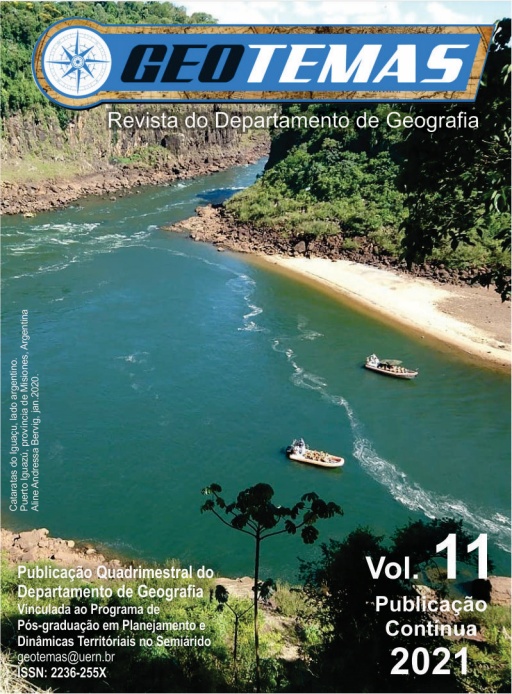Allow me to include geography in your considerations
DOI:
https://doi.org/10.33237/2236-255X.2021.3106Keywords:
Edward Saïd, suppression of geography, suppression of historyAbstract
The undefined subject of the title of this article is the narrator who talks to the late professor Edward Saïd, in a proposal that moves between anthropology and geography. Internationally famous for proposing reflections on intercultural debates, especially those linked to the dichotomy that involves the Western versus East clash, Edward Saïd established four dogmas to allude to what supports of the orientalist formulations. In addition to the West and East clash, orientalist dogmas serve any intercultural clash, although, in some specificities, some dogmas may prove to be more expressive than others. Among Saïd's dogmas, there is the strength of the suppression of historical experience, which is the disregard of the effects of identity and cultural dynamism submitted to atomistic time in movement. We resent, however, the suppression of geography, understood as formulations that unite what is spatially separated and separate what is spatially inseparable. Taking as a loan the reflections of the literary critic of Palestinian origin, the article in question penetrates the domains of the unsaid by proposing a strict interface between Saïd's writings and spatiality. The aim of this article is to present how the suppression of geography occurs, conceived as a dogma absent in Saïd's typology. To this end, we will work hermeneutically on the dogmas of orientalism, which powerfully synthesize the arguments of Saïd´s magnus opus.
Downloads
References
ANDERSON, B. Comunidades Imaginadas. São Paulo: Companhia das letras, 2008.
BAKER, A. An historico-geographical perspective on time and space and on period and place. Progress in Human Geography, v.5, i.3, p.439-443, September, 1981.
BAKER, A. Historical Novels and Historical Geography. Area, v.29, n.3, p.269-273, September, 1997.
BAUDRILLARD, J. A sombra das maiorias silenciosas. São Paulo: Brasiliense, 2006.
BAUMAN, Z. Modernidade líquida. Rio de Janeiro: Zahar, 2001.
BERDOULAY, V. A escola francesa de geografia. São Paulo: Pesrpectiva, 2017.
BERQUE, A. Geogramas, por uma ontologia dos fatos geográficos. Geograficidade, v.2, n.1, verão, p.4-12, 2012.
BHABHA, H. O local da cultura. Belo Horizonte: editora UFMG, 2013.
BRAUDEL, F. A gramática das civilizações. São Paulo: Martins Fontes, 2004.
CANCLINI, N. Culturas Híbridas. São Paulo: Edusp, 2011.
CAPEL, H. Neopositivismo e Geografia Quantitativa. (in): CAPEL, Horacio. Ruptura e continuidade no pensamento geográfico. Maringá: EDUEM, 2013.
CHAKRABARTY, D. Postcolonial thought and historical difference. New Jersey: Princeton University Press, 2000.
CLAVAL, P. The cultural approach and geography – the perspective of communication. Norsk Geografisk Tidsskrift – Norwegian Journal of Geography, v.55, n.3, p.126-137, 2001.
CONRAD, J. O coração das trevas. São Paulo: Abril, 2010.
CORRÊA, R. L.; ROSENDAHL, Z. Sobre Carl Sauer: uma introdução. (in) CORRÊA, R. L.; ROSENDAHL, Z. (Orgs.) Sobre Carl Sauer. Rio de Janeiro: Eduerj, 2011.
COSGROVE, D; JACKSON, P. New Directions in Cultural Geography. Area, vol.19, n.2, jun, p.95-101, 1987.
COSGROVE, D. Ideas and culture: a response to Mitchell. Transactions of the Institute of British Geographers, v.21, p.574-575, 1996.
DARBY, H. C. On the Relations of Geography and History. Transactions and Papers (Institute of British Geographers), n.19, p.1-11, 1953.
DEBORD, G. A sociedade do espetáculo: comentários sobre a sociedade do espetáculo. Rio de Janeiro: Contraponto, 1997.
DENNY, W. Quotations in and out of Context: Ottoman Turkish Art and European Orientalist Painting. Leiden: Muqarnas, v.10, p.219-230, 1993.
DUNCAN, J; DUNCAN, N. (Re)reading the landscape. Environmental and Planning D. Society and Space, v.6, p.117-126, 1988.
DUNCAN, J; DUNCAN, N. Reconceptualizing the Idea of Culture in Geography: A Reply to Don Mitchell. Transactions of the Institute of British Geographers, New Series, v.21, n.3, p.576-579, 1996.
EAGLETON, T. A ideia de Cultura. São Paulo: Editora Unesp, 2011.
FOSTER, E. Finding Geography Using Found Poetry. The Geography Teacher, v.9, n.1, p.26-29, 2012.
FUKUYAMA, F. O Fim da História e o último homem. Rio de Janeiro: Rocco, 1992.
GILROY, P. Race ends here. Abringdon, Oxford: Ethnic and racial studies, v.XXXI, nº5, pp.838-847, 1998.
GOLD, J. An introduction to Behavioural Geography. New York: Oxford University Press, 1980.
GUIMARíES, A. S. A. Classes, Raças e Democracia. São Paulo: Editora 34, 2002.
GUIMARíES, A. S. A. Preconceito e Discriminação. São Paulo: Editora 34, 2004.
GUIMARíES, A. S. A. Racismo e Antirracismo no Brasil. São Paulo, Editora 34, 2009.
HAESBAERT, R. Regional-Global. Rio de Janeiro: Bertrand Brasil, 2010.
HALBWACHS, M. A Memória Coletiva. São Paulo: Editora Vértice, 1990.
HALL, S. Pensando a diáspora: reflexões sobre a terra no exterior (in): HALL, Stuart- Sovik, Liv (org.). Da diáspora: identidades e mediações culturais. Belo Horizonte: Ed.UFMG, 2013.
HARRIS, C. Theory and synthesis in historical geography. Canadian Geographer, v.xv, n.3, p.157-172, 1971.
HARTSHORNE, R. Propósitos e natureza da Geografia. São Paulo: Hucitec Edusp, 1978.
HARVEY, D. Explanation in Geography. Bristol: Edward Arnold, 1986.
HARVEY, D. Condição Pós-Moderna. São Paulo: Edições Loyola, 2004.
HEPBURN, R. Literary and Logical Analysis. The Philosophical Quarterly, v.8, n.33, p.342-356, October, 1958.
HUNTINGTON, S. O Choque das Civilizações. Rio de Janeiro: Objetiva, 1997.
JACKSON, P. The idea of culture: a response to Don Mitchell. Transactions of the Institute of British Geographers, v.21, p.572-573, 1996.
JACKSON, R.; SORENSEN, G. Introdução í s relações internacionais. Rio de Janeiro: Jorge Zahar, 2007.
JAMESON, F. O romance histórico ainda é possível? Novos Estudos, v.77, p.185-203, Mar. 2007.
JOHNSTON, R. J. Geografia e Geógrafos. São Paulo: Difel, 1986.
KIRMAN, J. Aesthetics in Geography: Ideas for Teaching Geography Using Poetry. Journal of Geography, V.106, n.5, p.207-214, 2007.
KONG, L. A "new" cultural geography? Debates about invention and reinvention. Scottish Geographical Magazine, v.113, n.3, p.177-185, 1997.
LANDO, F. Fact and Fiction: Geography and Literature. Geojournal, v.38, n.1, p.3-18, 1996.
LANGTON, J. The Two Traditions of Geography, Historical Geography and the Study of Landscapes. Geografiska Annaler, v.70, n.1, p.17-25, 1988.
LARAIA, R. de B. Cultura: um conceito antropológico. Rio de Janeiro: Jorge Zahar, 2009.
LEWIS, B. Os assassinos: os primórdios do terrorismo no islã. Rio de Janeiro, Jorge Zahar, 2003.
LEWIS, B. O que deu errado no Oriente Médio? Rio de Janeiro: Jorge Zahar, 2002.
LEWIS, B. A crise do islã: Guerra Santa e Terror profano. Rio de Janeiro: Jorge Zahar, 2004.
LEWIS, B. A descoberta da Europa pelo islã. São Paulo: Perspectiva, 2010.
MASSEY, D. Globalisation: What does it means for geography? Geography, v.87, n.4, p.293-296, October, 2002.
MEREDITH, T. The upper Columbia valley, 1900-1920: an assessment of "boosterism" and the "biography of landscape". Canadian Geographer, n.29, p.44-55, 1985.
MIKESELL, M. The myth of nation state. Journal of Geography, v.82, n.6, p.257-260, 1983.
MITCHELL, D. There's No Such Thing as Culture: Towards a Reconceptualization of the Idea of Culture in Geography. Transactions of the Institute of British Geographers. New Series, v.20, n.1, p.102-116, 1995.
MITCHELL, D. Explanation in Cultural Geography: A Reply to Cosgrove, Jackson and the Duncans. Transactions of the Institute of British Geographers, v.21, n.3, p.580-582, 1996.
MITCHELL, D. Não existe aquilo que chamamos de cultura: para uma reconceitualização da ideia de cultura em geografia. Espaço e Cultura, Rio de Janeiro, UERJ, nº8, p.31-51, ago/dez de 1999.
MUNN, N. The cultural anthropology of time: a critical essay. Annual Review of Anthropology, v.21, p.93-123, 1992.
NAME, L. O conceito de paisagem na geografia e sua relação com o conceito de cultura. Geotextos, v.6, n.2, dez., p.163-186, 2010.
NANDY, A. A mente não colonizada: uma visão pós-colonial da índia e do Ocidente. (in) CASTRO, L. R. Ashis Nandy: A imaginação emancipatória – desafios do século 21. Belo Horizonte: Editora UFMG, 2015.
OHMAE, K. O fim do Estado-nação. Rio de Janeiro: Campus, 1999.
RELPH, E. The critical description of confused geographies (in): ADAMS, Paul C.; HOELSCHER, S.; TILL, K. E. Textures of Place. Minneapolis and London: Minnesota University Press, 2001.
ROWNTREE, L. Cultural/humanistic geography. Progress in Human Geography, v.10, n.4, p.580-586, 1986.
PEDROSA, B. V. O império da representação: a virada cultural e a geografia. Espaço e Cultura, UERJ, n.39, jan./jun, p.31-58, 2016.
PIRES, C. L. Z. Entre o lugar e o além-lugar: o jogo de espelhos, paisagens, geografias. Uberlândia: Caminhos de Geografia, v.18, nº63, 2017.
SAíD, E. W. Invention, Memory, and place. Critical Inquiry, v.26, winter, p.175-192, 2000.
SAíD, E. W. Orientalismo: o Oriente como invenção do Ocidente. São Paulo: Companhia de Bolso, 2007.
SAíD, E. W. Cultura e Imperialismo. São Paulo: Companhia de Bolso, 2011.
SANTOS, M. Por uma outra globalização. Rio de Janeiro: Record, 2012.
SAUER, C. The personality of Mexico. The geographical Review, v.31, n.3, july, 1941.
SAUER, C. A morfologia da paisagem. (in): OAKES, Timothy S; PRICE, Patricia L (eds). The Cultural Geography Reader. New York: Routledge, 2008.
SILVA, L. L. S. da. A evidência de práticas orientalistas como instrumento do imperialismo no pós-11 de setembro. Belo Horizonte: Revista Geografias, nº 17, p. 56-74, 2013.
SILVA, L. L. S. da. O embate entre Edward Said e Bernard Lewis no contexto da ressignificação do Orientalismo. Niterói: Revista Antropolítica, n.40, 1º Semestre, p.280-306, 2016.
SILVA, L. L. S. da. A supressão da geografia no exercício da alteridade. Fortaleza: Geosaberes, v.9, n.17, p.1-13, 2018.
SILVA, L. L. S. da. A geografia entre a materialidade e a imaterialidade. Geotemas, v.10, n.2, p.25-47, 2020a.
SILVA, L. L. S. da. A reificação da cultura e sua influência na geopolítica. Revista de Geopolítica, v.11, n.4, p.80-95, Out./Dez., 2020b.
SILVA, L. L. S. da.; COSTA, A. A inadequação das regionalizações culturais mediante os pressupostos do pós-colonialismo. Geotextos, v.14, n.1, p.225-247, 2018a.
SILVA, L. L. S. da.; COSTA, A. Cultura como comunidade imaginada: uma crítica í abordagem ontológica da cultura nos estudos geográficos. Geografias, v.16, n.1, p.27-41, 2018b.
SILVA, L. L. S. da.; COSTA, A. Questionando as delimitações cartográficas da cultura. Caminhos da Geografia, v.21, n.73, p.445-457, 2020.
SMITH, N. Geography, Science and post-positivist modes of explanation. Progress in Human Geography, v.3, i.3, p.356-383, 1979.
TUAN, Y. Topofilia: um estudo da percepção, atitudes e valores do meio ambiente. São Paulo: Difel, 1980.
VALENTINE, G. Whatever happened to the social? Reflections on the "cultural turn" in British Human Geography. Norwegian Journal of Geography, v.55, p.166-172, 2001.
WALLERSTEIN, I. O universalismo europeu: a retórica do poder. São Paulo: Boitempo, 2007.
WENDT, A. Anarchy is what states make of it. International Organization, v.46, p.394-419, 1992.
Downloads
Published
How to Cite
Issue
Section
License
Copyright (c) 2021 JOURNAL GEOTEMAS

This work is licensed under a Creative Commons Attribution-NonCommercial 4.0 International License.
Authors who submit their manuscripts to Geotemas declare that the work is an original article and has not been submitted for publication, in full or in part, in another national or international scientific journal or in another circulation vehicle. The authors also declare that they agree with the transfer of the copyright of the referred article to the magazine Geotemas (University of the State of Rio Grande do Norte), allowing for later publications, as long as the source of its publication is assured. Finally, they assume public responsibility for the article, being aware that any charges arising from a claim by third parties regarding the authorship of the work may apply to them.





















